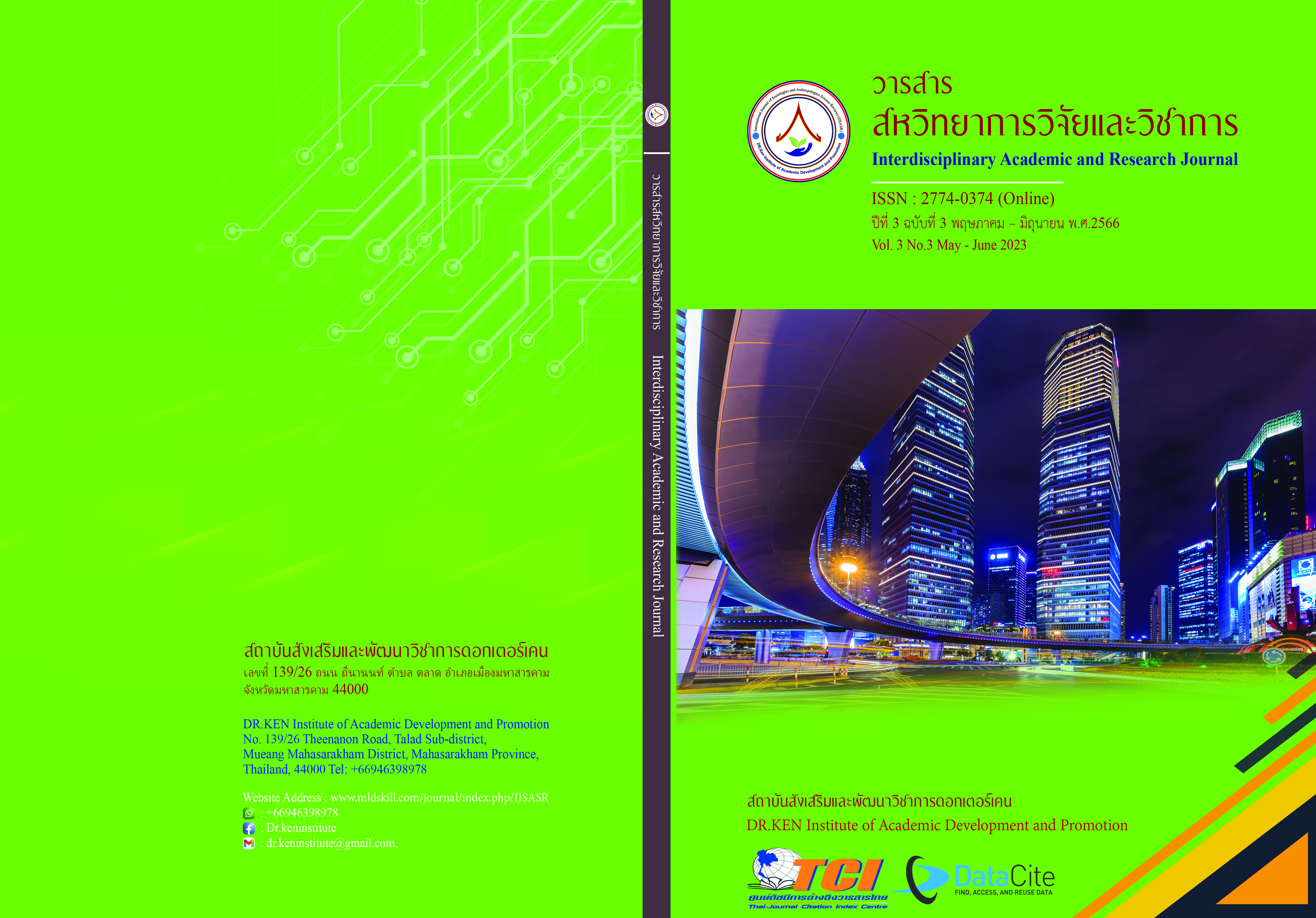The Curriculum Evaluation of the Bachelor of Arts Program in Home Economics (Revised, B.E. 2561) Faculty of Education, Ramkhamhaeng University
DOI:
https://doi.org/10.14456/iarj.2023.157Keywords:
Curriculum Evaluation; , Department of Home Economics; , Ramkhamhaeng UniversityAbstract
Assurance of educational quality of educational institutions according to the National Education Act of 1999 has been prescribed in Section 47 to provide educational quality assurance to improve the quality and standards of education at all levels both internally and externally. And Section 48 stipulates that the parent agencies and educational institutions establish a quality assurance system within educational institutions and consider internal quality assurance as part of the educational administration process that must be carried out continuously. Thus, the objectives of this study were to 1) evaluate the degree of satisfaction of the graduates' experience in the quality of the Arts Program (Revised, B.E. 2561) 2) evaluate the satisfaction of the graduates' work and the favorable characteristics of the graduates from the Bachelor of Arts programs. and 3) evaluate the degree of satisfaction of the teacher, who is responsible for the course and teacher for the administration of the degree of the Arts Program (Revised, B.E. 2561), Faculty of Education, Ramkhamhaeng University. The data was collected by survey research from 3 target groups comprising 52 graduates, 26 employers of these graduates, 10 lecturers, and curriculum committee members. The instruments of the study consisted of a questionnaire to evaluate the graduates' satisfaction with the quality of the program, a questionnaire to evaluate the employers' satisfaction with the graduates' job competency and their desirable characteristics, and a questionnaire to evaluate the curriculum committee members and lecturers' satisfaction towards the quality of the program. The satisfaction of all three target groups was analyzed by frequency distribution, percentage, mean and standard deviation. The research findings are as follows : (1) Firstly, the graduates expressed their overall satisfaction with the Bachelor of Arts Program in Home Economics. There are overall at the highest level, all sides were found to be very high, with the highest average: Teaching instructor, Minimum average area is learning support. (2) Graduate user satisfaction in performing and favorable characteristics of a graduate degree in the overall curriculum is high. Only interpersonal skills and responsibility were at the highest level, the rest of the group is at a very high level, while the least average area is intellectual skill. (3) the teacher in charge of the course and the teacher has a high degree of satisfaction in overall course management. The course management is only the highest level of the course management process, the rest is at a very high level, with the lowest average and medium-level areas being the contribution to learning.
References
กระทรวงศึกษาธิการ. (2553). กรอบมาตรฐานคุณวุฒิระดับอุดมศึกษาแห่งชาติ พ.ศ. 2552 (Thai Qualification Framework for Higher Education, TQF: HEd. กรุงเทพฯ: สำนักงานคณะกรรมการการอุดมศึกษา
นนทลี พรธาดาวิทย์. (2545). วิถีคหกรรมศาสตร์ในประเทศไทย : บทสะท้อนวิสัยทัศน์และกระบวนทัศน์ จากปัจจุบันสู่อนาคต. กรุงเทพฯ : มหาวิทยาลัยเกษตรศาสตร์.
นิอร ดาวเจริญพร. (2565). คหกรรมศาสตรศึกษาและการสร้างสมรรถนะผู้เรียนในอนาคต. Journal of Modern Learning Development. 7(7), 386-402.
บุรินทร์ ศิริเนตร์ รฐา จันทวารา พรพิมล ศรีธเรศ สถาพร ยังประยูร. (2563). คุณลักษณะบัณฑิตที่พึงประสงค์ตามความต้องการของผู้ใช้บัณฑิตทางด้านงานโรงแรม. วารสารมนุษยศาสตร์และสังคมศาสตร์ มหาวิทยาลัยราชภัฏอุบลราชธานี. 11(1), 287-303.
ปาริฉัตร ปิติสุทธิ และ สุปราณี มูลมาตย์. (2565). แนวทางการพัฒนาหลักสูตรเพื่อส่งเสริมทักษะวิชาชีพครูคหกรรมศาสตร์. วารสารวิธีวิทยาการวิจัย (Journal of Research Methodology: JRM). 35(2), 143-161.
ผ่องใส ถาวรจักร. (2555). ความพึงพอใจของผู้ใช้บัณฑิตวิทยาลัยราชพฤกษ์ปีการศึกษา 2554, รายงานวิจัย. กรุงเทพฯ: วิทยาลัยราชพฤกษ์.
ภูชิษย์ สว่างสุข ทอแสง หงษ์คำ,ณธษา พันธ์บัว,เหมือนแพร รัตนศิริ และจันทนี ธีรเวชเจริญชัย. (2555).การประเมินหลักสูตรศิลปศาสตรบัณฑิต สาขาวิชาคหกรรมศาสตร์ (หลักสูตรปรับปรุง พ.ศ. 2555) คณะศึกษาศาสตร์ มหาวิทยาลัยรามคำแหง.วารสารคหเศรษฐศาสตร์. 60 (3), 4-17.
มารุต พัฒผล. (2561). การประเมินหลักสูตรเพื่อการเรียนรู้และพัฒนา. พิมพ์ครั้งที่ 4. กรุงเทพฯ : บริษัท จรัลสนิทวงศ์การพิมพ์ จำกัด.
สมศรี เพชรโชติ. (2560). ปัจจัยที่มีอิทธิพลต่อการตัดสินใจเลือกเข้าศึกษาต่อหลักสูตรคหกรรมศาสตร์คณะศึกษาศาสตร์ มหาวิทยาลัยรามคำแหง. วารสารวิทยาลัยดุสิตธานี. 11(3), 168-184.
สำนักงานคณะกรรมการการอุดมศึกษา. (2548). เกณฑ์มาตรฐานหลักสูตรระดับปริญญาตรี พ.ศ. 2544. กรุงเทพฯ : สำนักงานคณะกรรมการการอุดมศึกษา กระทรวงศึกษาธิการ.
สำนักงานคณะกรรมการข้าราชการพลเรือน. (2552). คู่มือการบริหารทรัพยากรบุคคลในราชการพลเรือน : การประเมินผลการปฏิบัติราชการและการเลื่อนเงินเดือน. กรุงเทพฯ : สวัสดิการสำนักงาน ก.พ.
สำนักงานเลขาธิการสภาการศึกษา กระทรวงศึกษาธิการ. (2560). แผนการศึกษาแห่งชาติ พ.ศ. 2560 – 2579 .พิมพ์ครั้งที่ 1. กรุงเทพฯ : สำนักงานเลขาธิการสภาการศึกษา.
สุวิมล มธุรส. (2564). การจัดการศึกษาในระบบออนไลน์ในยุค NEW NORMAL COVID-19. วารสารรัชต์ภาคย์. 15 (40), 33-42
สุวิมล อุไกรษา, คุรุวรรณ สิริเกรียงไกร, น้อมพร เสน่ห์ธรรมศิริ และคณะ. (2562). การประเมินหลักสูตรศึกษาศาสตรบัณฑิต สาขาวิชาคหกรรมศาสตรศึกษา คณะศึกษาศาสตร์ มหาวิทยาลัยเกษตรศาสตร์. Veridian E-Journal, Silpakorn University, Humanities, Social Sciences and arts,12(2), 427-443.
อริสา มีพัฒน์ ชูศักดิ์ เอกเพชร และ สมคิด นาคขวัญ. (2560). การศึกษาการบริหารหลักสูตรระดับปริญญาตรีตามกรอบมาตรฐานคุณวุฒิระดับอุดมศึกษาแห่งชาติ พ.ศ. 2552 ของมหาวิทยาลัยราชภัฏสุราษฎร์ธานี. วารสารศึกษาศาสตร์ มหาวิทยาลัยทักษิณ. 17(2), 100-113
Brown, M. & Paolucci, B., (1978). Home Economics: A Definition. The University of Minnesota and Michigan State University, n.p. (Mimeographed).
Nurlaela, L., Astuti, N., Romadhoni, I.F., Puewidiani, N., & Handajani, S. (2019). Students’ Skills In Making Questions, Are They Indicators Of Their Thinking Skills? In 2019.IEEE Eurasia Conference on IOT, Communication, and Engineering (ECICE): pp.100-104. DOI:10.1109/ECICE47484.2019.8942761
Downloads
Published
How to Cite
Issue
Section
License
Copyright (c) 2023 เหมือนแพร รัตนศิริ, ภูชิษย์ สว่างสุข, พรดารา เขตต์ทองคำ, จันทนี ธีรเวชเจริญชัย, ทอแสง หงษ์คำ, ณธษา พันธ์บัวุ

This work is licensed under a Creative Commons Attribution-NonCommercial-NoDerivatives 4.0 International License.
Copyright on any article in the Interdisciplinary Academic and Research Journal is retained by the author(s) under the under the Creative Commons Attribution-NonCommercial-NoDerivatives 4.0 International License. Permission to use text, content, images, etc. of publication. Any user to read, download, copy, distribute, print, search, or link to the full texts of articles, crawl them for indexing, pass them as data to software, or use them for any other lawful purpose. But do not use it for commercial use or with the intent to benefit any business.
















.png)


